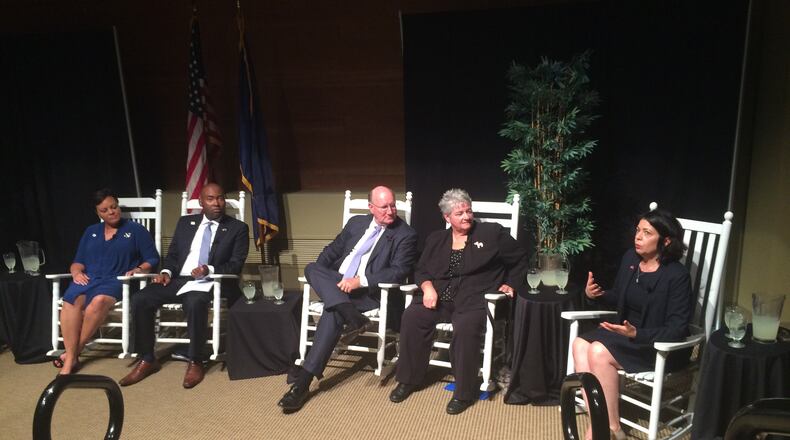Rock Hill, S.C. - South Carolina's Democratic Party chair opened a meeting with six of his counterparts with a question: How many have a Democrat elected to statewide office?
Three raised their hands, sheepishly looking at each other.
“It says to me that we’re in trouble in the South,” the chair, Jaime Harrison, offered after glancing around the room.
The Republican Party consolidated its strength across the South in this week's elections, winning the governor's race in Kentucky and fending off a well-funded Democratic challenge in the Virginia statehouse. Beleaguered Democratic chieftains gathered before the "First in the South" presidential forum here to talk about new strategies to answer a decades-old problem: How they can take back the region.
Their answers were largely familiar: Maximize minority support, focus on issues that resonate with the electorate and don’t give up on the dwindling white base that used to form the backbone of the party’s Southern support.
“We have got to do a better job of explaining why Democratic priorities are better,” said DuBose Porter, Georgia’s party chair. “We let someone else define who we are. And we’ve got to take it back quickly.”
Tennessee’s party chair, Mary Mancini, said the party should double-down on issues that face stiff Republican opposition but typically poll well among voters, such as Medicaid expansion and equal pay legislation. And relish incremental victories, she cautioned, even if they seem minute.
First, though, there’s a more basic quandary.
“We’re not even getting people who agree with us to vote,” Mancini said. “Turnout is the key. And those are the folks we’ve got to reach out to first.”
Allison Tant, Florida’s Democratic chair, said her party needs to soften an image of government that has “been demonized by Fox News.”
“When we advocate for our values, we’re fighting against the demonization of government,” she said.
The thorn in the side for many of the party chairs was the same issue that bedeviled Georgia leaders. White voters have steadily fled the party, stoking a debate in Georgia and elsewhere about whether the party should focus its resources on boosting the minority turnout instead of chasing white moderates.
“DuBose, you’re an endangered species here in the South: You’re a Democrat, you’re white and you’re male,” said Harrison. “How do we tackle this issue?”
Porter’s answer: Head on. Then Porter, a newspaper publisher from middle Georgia, offered an example of how the party might try to hone its message in 2016.
“We’ve got to create ‘Hell, you say’ moments,” said Porter. “We’ve got to create moments that get their attention on policy issues. We’ve got to create those moments where the light bulbs come on, to illuminate the issues.”
He ended on an optimistic note.
"We’re closer than people think," said Porter. "And it can happen in the presidential race if you start talking about issues that matter – and you have some ‘hell, you say' moments."
About the Author
The Latest
Featured




